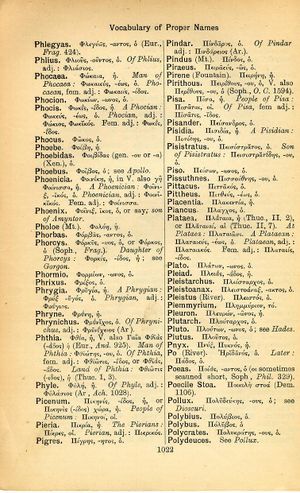Phocis: Difference between revisions
Τίς, ξένος ὦ ναυηγέ; Λεόντιχος ἐνθάδε νεκρὸν εὗρέ σ᾿ ἐπ᾿ αἰγιαλοῦ, χῶσε δὲ τῷδε τάφῳ, δακρύσας ἐπίκηρον ἑὸν βίον· οὐδὲ γὰρ αὐτὸς ἥσυχος, αἰθυίῃ δ᾿ ἶσα θαλασσοπορεῖ. → Who art thou, shipwrecked stranger? Leontichus found thee here dead on the beach, and buried thee in this tomb, weeping for his own uncertain life; for he also rests not, but travels over the sea like a gull.
(3_10) |
m (Text replacement - "}}]]" to "}}]]") |
||
| Line 1: | Line 1: | ||
{{WoodhouseENELnames | {{WoodhouseENELnames | ||
|Text=[[File:woodhouse_1022.jpg|thumb | |Text=[[File:woodhouse_1022.jpg|thumb | ||
|link={{filepath:woodhouse_1022.jpg | |link={{filepath:woodhouse_1022.jpg}}]]Φωκίς, -ίδος, ἡ. | ||
<b class="b2">A Phocian</b>: [[Φωκεύς]], -εως, ὁ. | <b class="b2">A Phocian</b>: [[Φωκεύς]], -εως, ὁ. | ||
Revision as of 10:07, 15 August 2017
English > Greek (Woodhouse)
Φωκίς, -ίδος, ἡ.
A Phocian: Φωκεύς, -εως, ὁ.
Phocian, adj.: Φώκιος, Φωκικός. Fem. adj.: Φωκίς, -ίδος.
Latin > English (Lewis & Short)
Phōcis: ĭdis, f., = Φωκίς,
I the country between Bœotia and Ætolia, in which were the mountains of Parnassus and Helicon, the Castalian spring, and the river Cephisus, Mel. 2, 3, 4; Plin. 4, 3, 4, § 7; Liv. 28, 5, 16; Ov. M. 1, 313; Stat. Th. 1, 64.—
2 Transf., erroneously, in consequence of the similarity in the sound, for Phocœa: Phocide relictā, Graii, qui nunc Massiliam colunt, etc., Sen. Cons. ad Helv. 7, 8; Luc. 3, 340; 4, 256; Sid. Carm. 23, 13; Gell. 10, 16, 4.—Hence,
A Phōcenses, ium, m., the Phocians, Plin. 3, 5, 10, § 72; Just. 8, 1, 2; Sol. 2.—
B Phōcēus, a, um, adj., Phocian: rura, Ov. M. 5, 276: Anetor, id. ib. 11, 348: juvenis, Pylades, son of King Strophius of Phocis, id. Tr. 1, 5, 21.—
C Phōcĭi, ōrum m., the Phocians, Cic. Pis. 40, 96.—
D Phōcăĭcus, a, um, adj., Phocian: tellus, Ov. M. 2, 569: laurus, i. e. from Parnassus, Luc. 5, 143.
Latin > French (Gaffiot 2016)
(1) Phōcĭs,¹⁴ ĭdis, f. (Φωκίς),
1 la Phocide [partie de la Grèce, entre la Béotie et l’Étolie] : Liv. 28, 5, 16
2 Phocée : Luc. 3, 340 ; 5, 53
3 Massilie : Sid. Carm. 23, 13 || v. Phoceus.
Latin > German (Georges)
(2) Phōcis2, idis u. idos, f. (Φωκίς), Phocis, eine Landschaft des nördlichen Griechenlands zwischen Böotien u. Ätolien, Liv. 28, 5, 16. Ov. met. 1, 313 (bei Sen. ad Helv. 8, 1 [7, 8]. Gell. 10, 16, 4. Lucan. 3, 340 u. 4, 256 durch Verwechselung mit Phocaea [s. d.] fälschlich als Mutterland der Kolonie Massilia angegeben: dah. poet. = Massilia b. Sidon. carm. 23, 13). – Dav.: A) Phōcaïcus, a, um, phocisch, tellus, Ov.: manus, Lucan. – B) Phōcēnsēs, ium, m., die Einw. von Phocis, die Phocier, Liv. – C) Phōcēus, a, um (Φώκειος), aus Phocis, phocëisch, Ov.: iuvenis Phoceus u. bl. Phoceus (der Phoceer) = Pylades, Sohn des Strophius, des Königs von Phocis, Ov. – D) Phōciī, iōrum, m., die Einw. von Phocis, die Phocier, Cic. Pis. 96.

